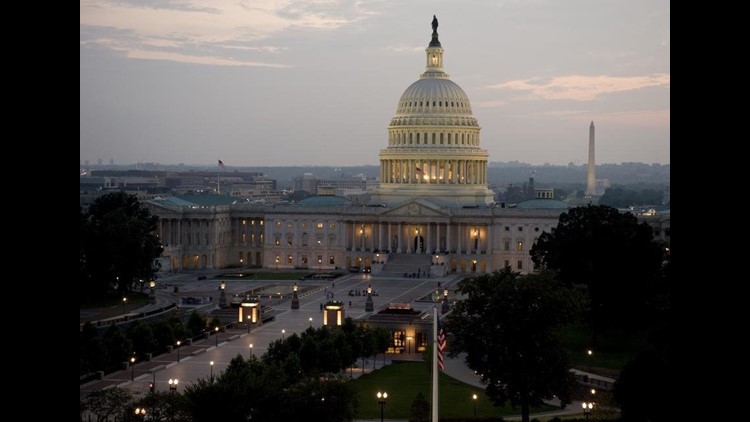It’s unclear whether the Senate can pass a $1.3-trillion spending package that will increase funding for the military and domestic spending and will keep the government funded through the end of September ahead of a shutdown deadline Friday night.
The House passed the legislation Thursday, voting 256-167 with Democrats and Republicans coming together to pass it less than 24 hours after the 2,300-page bill was made public.
Now, it’s up to the Senate to pass it before the government runs out of money Friday at midnight. The Senate needs unanimous consent — meaning all members have to agree — to bring the bill up for a timely vote. If one member objects, it could force the government into a brief shutdown, which is why many congressional observers are watching Kentucky Republican Sen. Rand Paul, who forced a brief shutdown last month using a similar procedural maneuver.
The Kentucky Republican has spent the past 24 hours criticizing the bill and the process by which the legislation is made public and passed, and appeared to be live tweeting his reading of the plan Thursday evening.
“Page 430 of ‘crumni-bus: Good news. The government is going to “earn” $350 million by selling oil from Strategic Petroleum Reserve,” he tweeted. “Bad news is the $ won’t go to reduce the $21 trillion debt. The $ will be instead be spent elsewhere by the Federal government.”
Vermont Sen. Patrick Leahy asked Senate Majority Leader Mitch McConnell when the Senate would vote — he smiled and said in front of reporters, “whenever Sen. Paul decides we can.”
But Paul said Thursday night that Senate leadership should reach out to him if they want to speed the process along.
“It’s just the way the rules are,” he told CNN’s Phil Mattingly. “I mean, they will eventually beat me. Time will run out and they will eventually win but if they’d like to do it in a more expeditious fashion, all they’ve got to do it call me.”
Paul said he was open to “compromise” but did specify what that would entail, but shortly after he spoke with CNN, Paul and McConnell spoke, a Paul spokesman said.
While senators waited to see if there would be a vote Thursday night, several Republican senators — including Ted Cruz of Texas and Joni Ernst of Iowa — came out against the bill, though there’s no indication that any of those senators would delay the timing on the vote, the way Paul might.
The massive spending package marks the end of a months-long funding stalemate in which lawmakers were forced to pass one short-term spending bill after another to stave off a shutdown. The package includes more than just money to fight the opioid epidemic, pay the military and fund more than $21 billion in infrastructure projects. It also includes policy changes like one that would incentivize states to enter more records into the country’s gun background check system and another that would cut off aide to the Palestinian Authority until Palestinians cease making payments to the families of terrorists.
President Donald Trump will sign the omnibus bill if it reaches his desk, Mick Mulvaney, the director of the Office of Management and Budget, told reporters on Thursday.
Mulvaney admitted that the bill wasn’t perfect and wasn’t exactly what the White House wanted, but that — on the whole — the bill “funds (Trump’s) priorities.”
While the bill attracted broad bipartisan support in the House, it didn’t win over everyone. On the right, lawmakers blasted the bill as a prime example of Washington’s bloated spending.
“If the bill passed the way it is, I would — I hope the White House does — does veto it. I don’t know if they will. It’s been a long process so they may not, but I think it’s not good for the American taxpayer, and it’s not consistent with — in any way close to consistent with what we said we would do when they elected us in 2016,” said Jim Jordan, a member of the House Freedom Caucus.
On the left, some Democrats rejected the proposal because it didn’t include permanent protectees under for recipients of the Deferred Action for Childhood Arrivals program.
“Anyone who votes for the omnibus is voting for the deportation of Dreamers and other immigrants. You will be voting to take money from law-abiding taxpayers — some of whom are immigrants — and give that money to privately-run prisons that will make a profit off of each and every human being our government hands over to them for detention and then deportation,” Luis Gutierrez, a Democrat from Illinois, said in a statement.
The internal GOP backlash to the amount of spending and the process of rushing the measure through just 16 hours after it was released was on full display on the House floor on Thursday. Twenty-five House Republicans broke with their leadership and opposed the usually party line procedural vote bringing up the legislation. But the measure narrowly passed 211-207.



